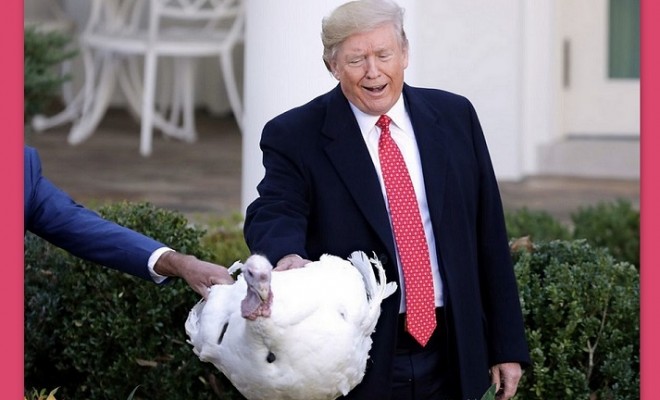
Why Does Trump Keep Pardoning Turkey?
The president once seemed willing to stand up to Recep Tayyip Erdogan. No longer
Even in the bitter and bilious place that Washington has become in the Trump era, the annual White House turkey pardon remains a heartwarming tradition. Every year, a few days before Thanksgiving, the president appears in the Rose Garden and pardons two birds—this year’s were wholesomely dubbed “Bread” and “Butter”—thus sparing them from slaughter, and delighting children and families in attendance.
But as a scholar of the Middle East, I can’t help but think of President Donald Trump’s other recent Turkey pardoning—yes, Turkey the country. (Forgive the pun, but Trump himself invoked it this week.) For a time, it seemed that Trump was breaking with U.S. precedent by applying significant diplomatic and economic pressure on Turkey. The fact that he secured the release of American pastor Andrew Brunson, who had been imprisoned in Turkey on made-up charges, seemed to vindicate Trump’s tough approach. But over the past year, he has fallen into a familiar pattern of issuing threats to punish Turkey for a variety of transgressions only to back off time and again. This has reinforced for Turkish President Recep Tayyip Erdogan that he can undercut American policy with impunity, and with potentially dangerous global consequences.
Trump’s deference to Erdogan was on full display when the Turkish leader visited the Oval Office on November 13, at a time when several serious issues bedeviled the U.S.-Turkey relationship. First, there was Turkey’s purchase over the summer of the Russian-made S-400 air defense system, which is designed to bring down NATO aircraft. Second: Turkey’s invasion of northern Syria this fall, which has killed hundreds of people and displaced hundreds of thousands. Trump gave Erdogan the greenlight for the incursion, but it complicates American efforts to fight the remnants of the Islamic State; the Turkish military and its allies are targeting Kurdish units that have been important U.S. partners. Then, in mid-October, there was the indictment by a federal grand jury in New York of Turkey’s state-controlled Halkbank, for helping Iran to evade United Nations sanctions.
This is to say nothing of Erdogan’s yearslong domestic crackdown on journalists, civil society groups, Kurdish politicians, academics, critics of his invasion of Syria and anyone else he deems to be an opponent. In theory, at least, the deepening of authoritarianism in Turkey is a development that U.S. officials should oppose.
Yet, in his joint news conference with Erdogan, Trump went out of his way to praise Turkey as a “great NATO ally” and “strategic partner.” That might sound like boilerplate for a meeting with a foreign counterpart, but at this particular moment it runs counter to reality. Even though Turkey has worked with affiliates of al-Qaida throughout much of the Syria conflict and has deployed extremist groups to fight in its recent push into Syria, Trump also declared, “We’re grateful to President Erdogan and to the citizens of Turkey for their cooperation in the constant struggle against terrorism. He fights it like we do.” Trump then repeated Turkish talking points about the Syria invasion, while also promising to complete a $100 billion U.S.-Turkish trade agreement.
In other words: a full exoneration.
The rosy picture Trump painted of Turkey as a democratic ally is based on fables handed down since the country became a NATO member in 1952. It is not terribly different from how Americans view the turkey as a friendly symbol of American values, when in fact the birds are often nasty and aggressive around people. The real Turkey shares neither America’s interests nor its values, and, quite unlike a member of the Transatlantic alliance is supposed to act, Turkey has aggressively pursued its foreign policy goals at Washington’s expense.
Συνέχεια ανάγνωσης εδώ
Πηγή: politico.com




